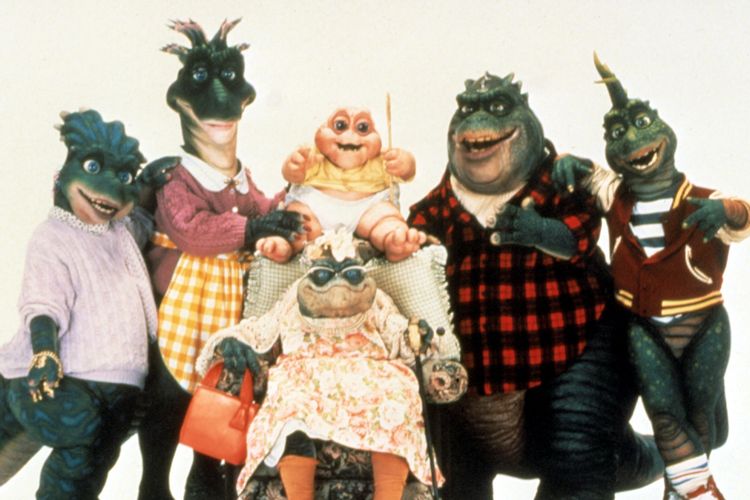OPINION: How ‘Dinosaurs’ stays relevant 30 years later
The prehistoric sitcom will always feel modern
The Sinclair family from the series “Dinosaurs”. From left to right, Charlene, Fran, Baby, Ethyl, Earl, and Robbie. The series focuses on the prehistoric family of the Sinclair’s who on many occasions deal with many contemporary issues. Photo Courtesy of ABC.
February 24, 2021
“A meteor, twice the size of Earth, is heading towards our planet and will destroy all life. This just in, no it’s not.”
On April 26, 1991, audiences were introduced to the Sinclair family, a family of dinosaurs living in the year 60,000,003 B.C., via the television sitcom “Dinosaurs.” Taking place much after dinosaurs had started to domesticate, the series follows the Sinclairs as they tackle issues that any family faces; angsty teenagers, cranky mother-in-laws and the start of modern society.
Originally conceived by beloved puppeteer Jim Henson before his untimely death, “Dinosaurs” took some time to finally see the light of day, but once it did it became one of the most unique sitcoms of all time.
The series is built on the premise of a sitcom starring dinosaurs, with some truly groundbreaking puppet and animatronic work, but what comes as surprise is how the show not only holds up in terms of its humor and characters, but in how it tackles contemporary themes that are still as relevant now as they were in the 90s or even prehistoric days.
Story continues below video.
“Dinosaurs” has a fairly standard sitcom premise. Earl Sinclair, voiced by Stuart Pankin, is the breadwinner of his house as he works throughout the week as a tree pusher. His wife Fran, voiced by Jessica Walter, is a stay-at-home mother who has to be the voice of reason in many of Earl’s antics. They also have to take care of their three children, Robbie, voiced by Jason Willinger, Charlene, voiced by Sally Struthers, and Baby, voiced by Kevin Clash.
The Sinclairs could have found themselves on a show that is similar to many other ABC family sitcoms, but their personalities and interactions with each other feel more in tune with families like the Simpsons or the Conners from “Roseanne.” Even if this family is made up of prehistoric creatures, they feel like a very modern family.
Earl is a very conservative-minded dinosaur. He’s someone who very easily follows and believes the words of his superiors — especially his boss Mr. Richfield, voiced ever-so-wonderfully by Sherman Hemsley — which is usually played for laughs and is seen as a deterrent for his character. While Fran usually is there to try to make Earl come to his senses, many times it’s his son Robbie who really puts things in a more cultural perspective, whether it’s stopping Earl from claiming land occupied by native cavemen or confronting him on his willingness to do whatever for the corporation he works for.
RELATED: REVIEW: The 5 best ‘Treehouse of Horror’ segments from ‘The Simpsons’
The relationship between Earl and Robbie is very much one most young people can relate to, being more progressive than their parents and trying their hardest to explain to them why they need to fix the way they think.
The series has that sense of relevancy with its characters and how it addresses topical issues headfirst. The show starts showing this fairly early on with the episode “I Never Ate for My Father.”
In this episode, Robbie starts to experiment with an herbivorous diet and wonders if he himself is a carnivore or herbivore. It’s an obvious allegory for homosexuality and young teens experimenting with their sexuality. He states how everyone in his family is a carnivore, especially his sister, and when Earl starts to suspect Robbie of being a herbivore he says to Fran that he probably got it from their uncle Elmo; he always ate off the wrong side of the plate.
A special shoutout to all gay uncles everywhere.
Is it a perfect allegory? Not exactly, but it’s going to be hard to make any allegory on being gay perfect without being fully explicit with it. Though it has a sweet enough ending, with the family having both meat and vegetables at dinner, and it displays how the show would tackle just about any hot-button topic.
Other episode subjects include television, which is really utilized in the episode “Network Genius” when all of Earl’s successful television pitches cause the population to become dumber.
Then there’s the episode “What ‘Sexual Harris’ Meant” that is all about how women have to try to persuade a court of older men that they were sexually harassed in the workplace. Or even the episode “And The Winner Is…” where Earl and Mr. Richfield are opponents in the election for the new Chief Elder, which can be best described by the episode itself as being an election between “a monstrous bloodthirsty psychopath and a self-confessed brain-dead ignoramus.”
If there was a contemporary issue, “Dinosaurs” was more than likely to cover it.
Though if there was one target that the show loved to pick on, it was corporations. The aptly named WeSaySo Corporation that Earl works for is a money guzzling and exploitative company that more often than not is usually the cause, or enables more, of the conflict in many episodes. Whether it be the constant verbal abuse Mr. Richfield throws at Earl, or, in one case, company actions leading to the destruction of all dinosaur civilization.
RELATED: REVIEW: ‘How To With John Wilson’ is the best show of the year you aren’t watching
Which brings me to the fairly infamous series finale, “Changing Nature.”
When the bunch beetles don’t arrive for their yearly migration to eat all the cider poppies in Pangea, it’s discovered that WeSaySo has built a wax fruit factory in the location of the swamp where the beetles would reproduce. To try to take care of the cider poppies that have taken over at this point, WeSaySo and Earl, who has been appointed to head the task force to handle the situation, cover all of Pangea in a poisonous gas that ends up killing all plant life on the planet.
Which then gives them the idea to erupt every volcano with the thought that it will bring clouds that cause rain to grow the plants back, but surprise, surprise it doesn’t. The cloud covers the whole planet causing it to freeze everywhere and leaving everyone to die. Even the Sinclairs.
There’s no happy ending here. No sitcom deus ex machina to save the day. The planet is in a crisis it can’t escape and everyone is facing the consequences. It’s an episode that smartly subverts sitcom tropes and comes as quite the hard-hitting call for environmental action. We don’t want to become like Earl and realize how badly we’ve been treating the planet when it’s too late. It’s quite the dark ending for such a humorous family sitcom, but that’s what makes it work so much and be so memorable.
Story continues below video.
Even with all these heavy topics the show focused on, it always knew to balance it out with some greatly imaginative and fun sitcom-style episodes.
One two-parter called “Nuts to War” critiques and satirizes the whole ordeal of war. It all starts over pistachio nuts, and even pokes at how corporations find themselves in war with WeSaySo making and giving weapons to the enemy. There’s also episodes about Baby Sinclair refusing to be toilet trained and him dealing with a monster under the bed. It’s exciting to see the show tackle so many things but still keep its unique sense of humor.
If you like a good meta joke or pun, you’re sure to love the humor here. I’ve never been so amused by a joke than the recurring anchorman character Howard Handupme. Or absolutely loving every single moment involving Earl’s dim-witted but very sincere and earnest best friend Roy.
It’s been just about 30 years since “Dinosaurs” first premiered and there really hasn’t been a sitcom like it since. Whether from a technical or a writing standpoint, it’s one-of-a-kind. With reboots being greenlit left to right, it won’t come as a surprise if it ever gets chosen. There’s no need to update a show like this when it still feels timely all these years later.
To play us out, here’s Baby Sinclair.




































































































































